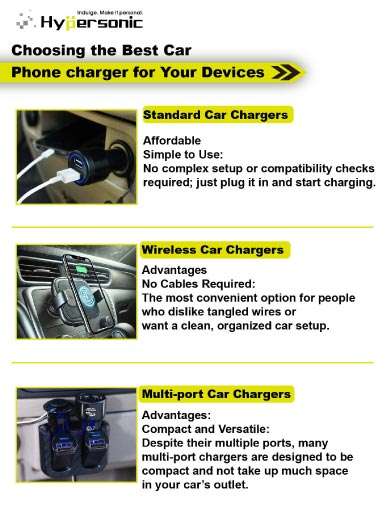In today’s hyper-connected world, staying powered up while on the move is no longer a luxury, but a necessity. From navigating unfamiliar routes to staying in touch with loved ones, our smartphones and other devices have become indispensable tools. This reliance makes understanding the world of car chargers crucial for ensuring a smooth and productive journey. Choosing the right car chargers can save you from the frustration of a dead battery at a critical moment and ultimately improve your overall driving experience. This guide will explore the various types of car chargers available, their features, and how to choose the best one for your specific needs.
Understanding Car Charger Types
The market offers a variety of car chargers, each with its own strengths and weaknesses. Here’s a breakdown of the most common types:
- USB-A Car Chargers: These are the most common type, utilizing the familiar USB-A port. They are generally inexpensive and compatible with a wide range of older devices. However, they often offer slower charging speeds compared to newer technologies.
- USB-C Car Chargers: Featuring the reversible USB-C port, these chargers often support faster charging protocols like Power Delivery (PD). They are becoming increasingly popular as more devices adopt USB-C connectivity.
- Dual-Port Car Chargers: These chargers offer two or more USB ports, allowing you to charge multiple devices simultaneously. This is a great option for families or individuals with multiple gadgets.
- Wireless Car Chargers: Utilizing Qi wireless charging technology, these chargers allow you to simply place your compatible device on the charging pad without the need for cables. They offer convenience but may not be as efficient as wired charging.
Factors to Consider When Choosing a Car Charger
Selecting the right car charger involves considering several factors to ensure it meets your specific needs. Here are some key aspects to keep in mind:
Charging Speed
The charging speed of a car charger is determined by its power output, measured in watts. Higher wattage chargers can deliver power to your device more quickly, reducing charging time. Look for chargers that support fast charging technologies like Quick Charge (QC) or Power Delivery (PD) if your devices are compatible.
Device Compatibility
Ensure that the car charger is compatible with your devices. Check the charging port type (USB-A, USB-C, etc.) and whether the charger supports the charging protocols required by your devices.
Safety Features
Choose a car charger with built-in safety features such as over-current protection, over-voltage protection, and short-circuit protection. These features help protect your devices from damage and prevent potential hazards.
Build Quality and Durability
Opt for a car charger made from high-quality materials that can withstand the rigors of daily use. A durable charger will last longer and provide a more reliable charging experience.
Comparing Car Charger Types
| Feature | USB-A Car Charger | USB-C Car Charger | Wireless Car Charger |
|---|---|---|---|
| Charging Speed | Slower | Faster | Moderate |
| Compatibility | Wide (Older Devices) | Growing (Newer Devices) | Limited (Qi-Enabled Devices) |
| Convenience | Standard | Standard | High |
| Price | Lower | Moderate | Higher |
Ultimately, the best car charger for you will depend on your individual needs and preferences. Consider the type of devices you need to charge, the charging speed you require, and your budget. Remember to prioritize safety and choose a charger from a reputable brand. With the right car charger, you can keep your devices powered up and stay connected on the go.

